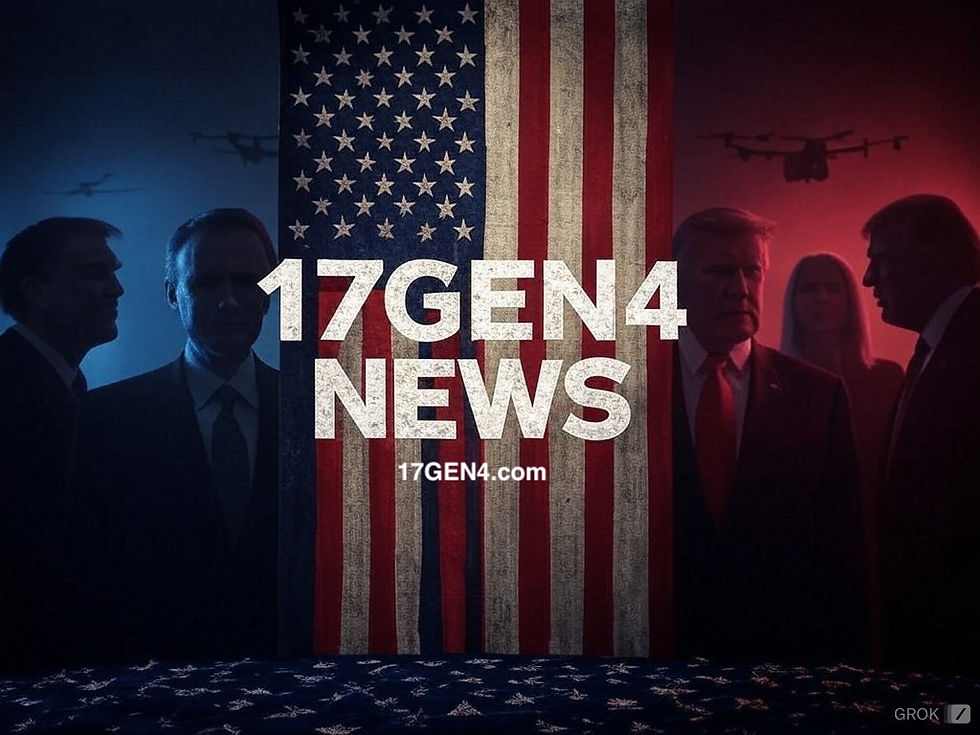Ontario Premier Threatens to Halt U.S. Electricity Exports Amid Trump’s Escalating Trade War
- 17GEN4

- Mar 4
- 3 min read
Toronto, March 4, 2025 – In a bold escalation of tensions between Canada and the United States, Ontario Premier Doug Ford has doubled down on his threat to cut off electricity exports to several American states as President Donald Trump’s trade war intensifies. Speaking at a mining convention in Toronto on Monday, Ford declared he would take drastic measures—including shutting off power to Michigan, New York, and Minnesota—“with a smile on my face” if the U.S. proceeds with its newly enacted 25% tariffs on Canadian goods.
“They rely on our energy, they need to feel the pain,” Ford said, emphasizing the interdependence of the two nations’ economies. “If they want to come at us hard, we’re going to come back twice as hard.” The remarks come as Trump’s tariffs, which took effect Tuesday, March 4, threaten to upend decades of cross-border trade cooperation, prompting a fierce response from Canadian leaders.
Ford’s comments underscore the critical role Ontario plays in powering the U.S. Northeast and Midwest. In 2023, the province supplied electricity to 1.5 million American homes, making it a key exporter to border states. The U.S. imported approximately 33 terawatt-hours of Canadian electricity that year, with Ontario and Quebec leading the charge, according to the Canada Energy Regulator. Ford’s threat, if realized, could disrupt power supplies and spike costs for millions of American consumers, particularly in regions heavily reliant on Canadian hydropower and nuclear energy.
The tariffs, announced by Trump on Monday, mark the culmination of a 30-day window he had granted Canada and Mexico to address concerns over border security and drug trafficking. Claiming that “vast amounts of fentanyl” continue to flood into the U.S., Trump dismissed further negotiations, stating, “The tariffs are all set. They go into effect tomorrow.” The move has drawn sharp criticism from Canadian officials, who argue that the northern border accounts for less than 1% of illegal crossings and fentanyl seizures, according to Public Safety Minister Dominic LeBlanc.
Canadian Prime Minister Justin Trudeau, returning from a European trip on Monday, condemned the tariffs as “absolutely devastating” for Canada’s economy, warning that Americans would also face “real hardship” from higher prices on goods ranging from food to automobiles. In response, Trudeau unveiled plans for retaliatory tariffs on $20.7 billion worth of U.S. imports, including orange juice, peanut butter, and appliances, with an additional $125 billion in tariffs slated to follow if Trump’s measures persist.
Ford, a populist conservative leading Canada’s most populous province, has emerged as a vocal advocate for a hardline stance. “I didn’t start this tariff war, but we’re going to win this tariff war,” he asserted, rallying provincial leaders to stand united with the federal government. While Ford framed the energy cutoff as a “last resort,” he left little doubt about his willingness to wield Ontario’s leverage in the dispute. “If they want to try to annihilate Ontario, I will do everything—including cut off their energy,” he said.
The threat has sparked debate over its feasibility, as international energy policy typically falls under federal jurisdiction in Canada. Experts suggest that while Ontario could technically reduce electricity output—particularly from natural gas plants—the move would require Ottawa’s approval and could trigger broader economic fallout. “It’s not like flipping a switch,” said Daniel Rosenbloom, a Carleton University professor specializing in energy policy. “This could escalate into chaos, and I’m worried about the unintended consequences.”
On the U.S. side, Trump shrugged off Ford’s warning during a Thursday appearance at the New York Stock Exchange, saying, “That’s OK if he does that. We’re subsidizing Canada, and we shouldn’t have to.” The president-elect has maintained that his tariffs aim to reshore manufacturing and protect American interests, urging Canadian firms to build plants in the U.S. to avoid the levies.
As both nations dig in, economists warn of dire consequences. A trade war could plunge Canada into a recession by mid-2025, with inflation potentially surging to 7.2% and unemployment rising to nearly 8%, according to Oxford Economics. Meanwhile, U.S. consumers could see gas prices jump by up to 70 cents per gallon, and Midwestern states like Michigan—reliant on Canadian imports for 19% of its GDP—face significant risks, per Fitch Ratings.
With billions in daily cross-border trade at stake, Ford’s provocative stance signals a readiness to fight fire with fire. Whether his threat materializes into action remains uncertain, but one thing is clear: as Trump’s trade war rages, the stakes for both Canada and the U.S. have never been higher. 17GEN4.com

Comments